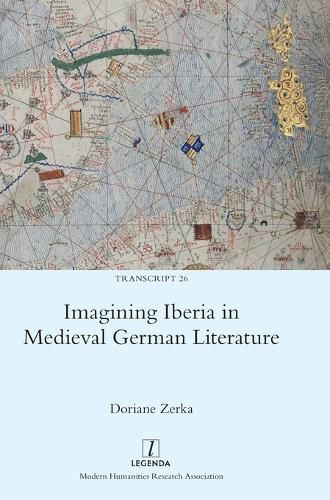Readings Newsletter
Become a Readings Member to make your shopping experience even easier.
Sign in or sign up for free!
You’re not far away from qualifying for FREE standard shipping within Australia
You’ve qualified for FREE standard shipping within Australia
The cart is loading…






This title is printed to order. This book may have been self-published. If so, we cannot guarantee the quality of the content. In the main most books will have gone through the editing process however some may not. We therefore suggest that you be aware of this before ordering this book. If in doubt check either the author or publisher’s details as we are unable to accept any returns unless they are faulty. Please contact us if you have any questions.
A porous boundary zone between Europe and Africa, a space at once liminal and peripheral, both a gateway and a border defined through cultural and religious alterity - medieval Iberia challenges post-medieval notions of East, West, nationhood and Europe. Examining the ideological implications of real and fictional travels to the Peninsula in German-language texts ranging from the twelfth to the fifteenth century, Doriane Zerka considers the construction of individual and collective identities, religious, cultural and political. Combining the work of Michel Foucault, postcolonialism and network theory, she sheds light on the ideological processes contributing to the construction of any cultural entity modern audiences might call 'Spanish', 'German' or 'European'. Doriane Zerka is Leverhulme Early Career Fellow in the Faculty of Modern and Medieval Languages and Linguistics, University of Cambridge. Imagining Iberia is her first book, and has been awarded the 2020 Women in German Studies Book Prize and the 2020 Preis der Gesellschaft fuer interkulturelle Germanistik fuer juengere Forscherinnen und Forscher.
$9.00 standard shipping within Australia
FREE standard shipping within Australia for orders over $100.00
Express & International shipping calculated at checkout
This title is printed to order. This book may have been self-published. If so, we cannot guarantee the quality of the content. In the main most books will have gone through the editing process however some may not. We therefore suggest that you be aware of this before ordering this book. If in doubt check either the author or publisher’s details as we are unable to accept any returns unless they are faulty. Please contact us if you have any questions.
A porous boundary zone between Europe and Africa, a space at once liminal and peripheral, both a gateway and a border defined through cultural and religious alterity - medieval Iberia challenges post-medieval notions of East, West, nationhood and Europe. Examining the ideological implications of real and fictional travels to the Peninsula in German-language texts ranging from the twelfth to the fifteenth century, Doriane Zerka considers the construction of individual and collective identities, religious, cultural and political. Combining the work of Michel Foucault, postcolonialism and network theory, she sheds light on the ideological processes contributing to the construction of any cultural entity modern audiences might call 'Spanish', 'German' or 'European'. Doriane Zerka is Leverhulme Early Career Fellow in the Faculty of Modern and Medieval Languages and Linguistics, University of Cambridge. Imagining Iberia is her first book, and has been awarded the 2020 Women in German Studies Book Prize and the 2020 Preis der Gesellschaft fuer interkulturelle Germanistik fuer juengere Forscherinnen und Forscher.